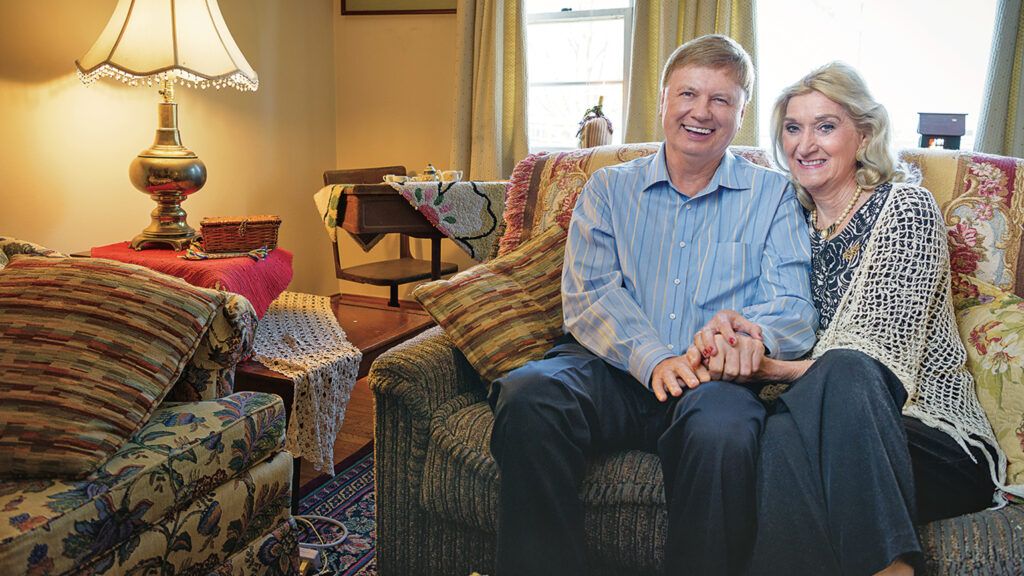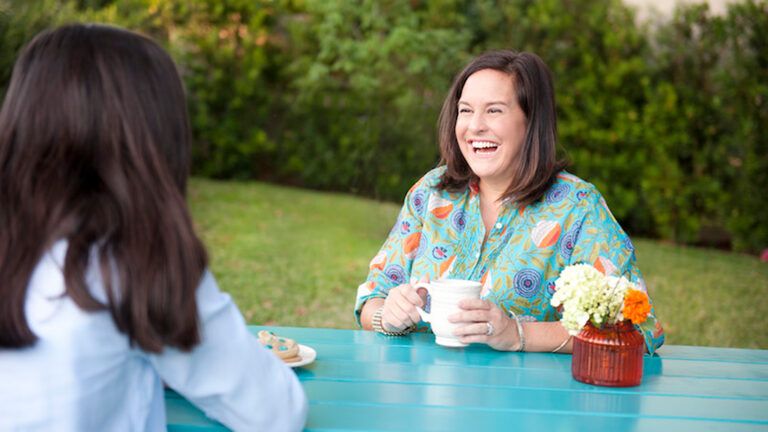Note: This story contains descriptions of attempted suicide.
That Sunday my wife, Trish, had gone to Mass without me as usual. As much as I wanted our marriage, our family, to be close again, I still couldn’t bring myself to go back to church regularly. Not after everything that had happened.
On her way home, Trish had picked up The Philadelphia Inquirer. I sat at the kitchen table with her and glanced at the front page. January 20, 2008. The presidential primaries were in full swing; the country was in a recession.
My concerns were closer to home. A year earlier, I’d moved back in, after being separated from Trish for five years. I was grateful to be home again, but there still seemed to be a barrier between me and my wife and our children. After all we’d been through—all I’d put them through—I wanted to put the past behind us. How else would we be able to move on with our lives?
BROWSE OUR SELECTION OF BOOKS ON CHRISTIAN LIVING
A headline caught my eye: “After leap breaks body, a miracle renews spirit.” The story was about Jordan Burnham, an 18-year-old in the next town over. He’d had everything going for him—athletic, popular, elected to the homecoming court. But he had struggled with depression and, that past September, jumped from the ninth floor of an apartment building. And survived.
It was as if I were reading my own story, only I was nowhere near as brave as this young man.
The trouble for me had started in the waning months of 1998. I was a senior financial analyst at Bristol-Myers Squibb, the pharmaceutical giant. My boss called me into her office and told me, “You’re probably going to be let go. The whole department may shut down.” I knew how bleak the financials were. That was my job—projecting sales trends, doing cost analyses. Information to be shared only with company VPs. I was a good employee. I kept those secrets.
But the weight of what I knew hung over me. I was the provider. Trish was a stay-at-home mom. Our four kids, ages nine to 16, were in Catholic school. If I lost my job, we wouldn’t be able to pay their tuition, the mortgage, car payments, our other bills. What kind of man couldn’t take care of his family? I worked even harder, nights, weekends. There had been times I felt down, not good enough, in the past. I’d always managed to push through them. But I couldn’t push through this. The stress ate at me. I couldn’t sleep. I had no appetite and lost 60 pounds. My blood pressure was off the charts. I had debilitating headaches.
My family doctor prescribed anti-anxiety medication. I didn’t like the side effects and stopped taking it. I saw a neurologist and a cardiologist. They couldn’t figure out what was wrong. I went to church with Trish and the kids every Sunday, prayed for healing every night. No answers from God either.
By early 1999, the pressure was overwhelming. One April morning, I was driving to work, my head throbbing, dreading another long day at my desk. This needs to end, I thought. I’d stopped praying by then. Obviously, my life meant nothing to God. I’d been a fool to think it ever had.
Bible Verses for Depression
I pulled over, the engine still running. I got out and put my mouth to the tailpipe, trying to inhale carbon monoxide. Minutes passed. Nothing happened. Loser. Can’t do anything right.
I went home and told Trish. She took me straight to the hospital. They kept me overnight and discharged me the next morning with a referral to outpatient therapy. I didn’t understand why. My problems were physical, not mental.
That night I couldn’t stay still. I paced the house, my heart racing. Trish found me passed out.
I was admitted to the hospital again, to the cardiology unit on the third floor. Trying to cheer me up, Trish brought me photos of our family in happier times. The pictures only reminded me those days were long gone. Trish can’t help me. The doctors can’t help me. Nobody can help me.
Trish stepped out to call her mom. My eyes went to the open window. There was only one release from my suffering. This time I’d do it right.
I went to the window, opened it all the way. I stood on the sill for a moment, leaned toward the opening. Then I flung myself out. Headfirst.
The ground flew up to meet me. A thunderous crash. Screaming pain. Everything went black.
I woke up in the psychiatric ward, my wrists in restraints. Trish sat at my bedside. “Your legs were shattered,” she said. “It’s a miracle you’re alive.”
I looked down at my legs—held in place by metal frames and screws— then back at Trish. Her eyes were shadowed. How was this a miracle? I’d wanted to escape pain, not inflict it on my wife. Shame filled me.
“I didn’t mean to hurt you,” I said. “Please don’t tell anyone I tried to…” I couldn’t even say the word suicide.
Trish nodded. “I wouldn’t want people talking about our family, judging us,” she said.
A psychiatrist met with me that afternoon. “You are clinically depressed,” he said. “It’s different from being sad. There’s a chemical imbalance in your brain. The medication I’ve prescribed will help, but there are things you’ll need to work through. How you perceive yourself. How you deal with stress.”
After five weeks, I went home. I wasn’t able to walk, so Trish had set up a bed for me in our living room. The antidepressant made a difference. I was sleeping and eating. But I was far from healed. I got frustrated by my slow progress in physical therapy and psychotherapy, and I grew irritable with my family.
Trish had to take care of everything—the kids, the house, the bills. And me. I wish I could say I saw the toll it was taking on her, but I was too caught up in my own issues. One of which was keeping my suicide attempt under wraps.
Only our two oldest kids and a few close relatives and friends knew the truth, and they were sworn to secrecy. If anyone asked, we told them I’d been in a car accident. Or that I’d fallen down the stairs. I didn’t want people labeling me as mentally ill, so I didn’t say more, not even to my wife and children.
Trish urged that we go to counseling as a family. Absolutely not, I told her. I had no interest in reliving my depression, my pain. I just wanted to pretend I’d never attempted suicide.
Trish joined a support group. She went to church every day and saw a therapist. One night she told me, “My therapist thinks we should live apart. I’ve thought and prayed about it, and I agree. I need time and space to heal and be a healthy parent to our kids.”
I hated to leave, but part of me knew it was for the best. I moved into my late father’s apartment. I’d gone on disability, and I knew I couldn’t go back to corporate life. When I was able to walk and drive again, I got a job at Jos. A. Bank, selling men’s clothing.
What Trish had said about being a healthy parent struck a chord. I continued with therapy and came to realize I’d had depressive tendencies all my life; fear of losing my job had amplified them. I’d always been prone to seizing on the worst possible outcome. So I began reading books about managing negative thoughts and emotions. I practiced mindfulness meditation. I didn’t pray or return to church. I was still angry at God for letting me suffer. I saw the kids on weekends; we had fun together. I thought I was doing well.
One day in 2006, Trish wanted to talk about our youngest, our son, who’d just turned 16. “He misses you so much,” she said. “He needs a dad at home.”
I moved back in two days later. In my mind, I thought Trish was telling me she was ready for us to be husband and wife again. Not quite. One day not long after I’d returned home, we walked to a riverbank where she liked to sit and pray. It was a peaceful, beautiful setting. I put my arm around Trish, but she pulled away.
“John, we’ve never talked about what happened. And we need to.”
I sighed. “I can’t.”
I really couldn’t. As if some force were keeping me from opening up.
Until I saw that newspaper article about Jordan Burnham. He was so honest about his depression and about wanting to kill himself. Jordan’s parents and sister were equally honest about their pain and lack of understanding.
I understood exactly what Jordan had gone through. My story could have helped him. If only I’d been willing to share it. If only I hadn’t let fear and shame close me off from the people I love, from the God who loves me so much he saved my life, even when I didn’t believe it was worth living.
“I don’t want one more family to go through this!” I said.
Trish looked over at me. “Go through what?” she asked.
I showed her the article. “Can we have dinner together tonight, the six of us?” I said. “There’s something I need to talk about.”
Trish squeezed my hand. “Not just you,” she said. “It’s what we all need.”
That night, for the first time, I talked to Trish and our kids about my depression, how ending my life had seemed like my only option, what I’d learned through therapy. They talked about how my suicide attempt had affected them. There would be many more conversations, but it was a start. Already the barrier between us was crumbling.
“I’d like us to write a book,” I said. “With all of our perspectives. And I want to speak out. I want people to know the truth about depression and suicide. That there’s nothing to be ashamed of.”
The next week, Trish arranged for our family to speak at a synagogue. It was difficult for all of us; much of what we said, we’d never expressed before. Yet it was also freeing and invigorating.
Afterward, people crowded around to tell us their stories. Since then I’ve given speeches at churches, synagogues, schools, civic groups. I even met Jordan Burnham at a talk and told him what a difference he’d made in my life. He showed me that when we open up and share our pain, we open ourselves to God’s healing love.
For more inspiring stories, subscribe to Guideposts magazine.






